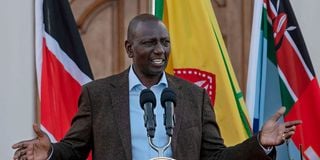Breaking News: Ruto postpones school reopening indefinitely due to flooding
Ruto’s sense of self-importance bad for Kenya

President William Ruto.
Throughout President William Ruto’s leadership, he has projected himself as a hardworking, go-getter, and unparalleled political strategist.
Granted, the President has attained the highest levels of aspirations which an American psychologist Abraham Maslow referred to in his popular theory of hierarchy of needs as self-actualisation.
From obscurity, President Ruto won a parliamentary seat which became a springboard that promoted him to various and enviable ranks in government. Despite these tremendous achievements, Ruto’s grandiosity, particularly as President, seems to be betraying his dream of bringing a change in the lives of the most deserving Kenyans he referred to during campaigns as hustlers.
His all-knowing and all-powerful approach to governance reveals that President Ruto is suffering from an inflated sense of self-importance. From a psychological perspective, the doctrine of self-importance is a personality disorder which somehow resonates with narcissistic personality. It is characterised by a puffed-up ego that exaggerates one’s own importance and abilities in juxtaposition with others.
People with self-importance syndrome have “unreasonably high sense of their own importance. They need and seek too much attention and want people to admire them. People with this disorder may lack the ability to understand or care about the feelings of others…and are easily upset by the slightest criticism”.
President Ruto has developed a sense of exaggerated importance in the face of a country and a people that are desperately looking up to him to solve social and economic problems and not to hold himself higher than he should as the best gift to Kenya since independence. In fact, President Ruto’s self-importance is demonstrated daily in the way he shapes and implements policies of his administration.
Instead of listening to the people of Kenya so that he can formulate all-inclusive policies that resonate with the people’s situations, the President despises the same people who elected him. The President erroneously believes that he’s the smartest guy in the room and that every other person must line up behind himself as mere cheerleaders.
Instead of negotiating with stakeholders, he dictates to them what is right and wrong in a condescending manner that kills morale in public service, destroys investor confidence, and undermines expert views. This situation has caused public officials to exhibit indifference to offering professional views.
Unfortunately, public officials appear to be telling President Ruto what he wants to hear in order to massage his puffed-up ego as opposed to telling him the uncomfortable truths that can set him free.
Instead of abiding by the timeless doctrine of separation of powers between branches of government in the interest of mutual respect and separation of powers, President Ruto wages an all-out war against other branches of government.
In a democracy such as Kenya, it is imperative for a leader to negotiate with citizens and critical stakeholders. A leader must lead through collaboration and humility not dictatorship. The scriptures proclaim that God humbles the proud and gives grace to the humble.
Mr Ambuka is a human rights consultant based in Pennsylvania, US. [email protected]




